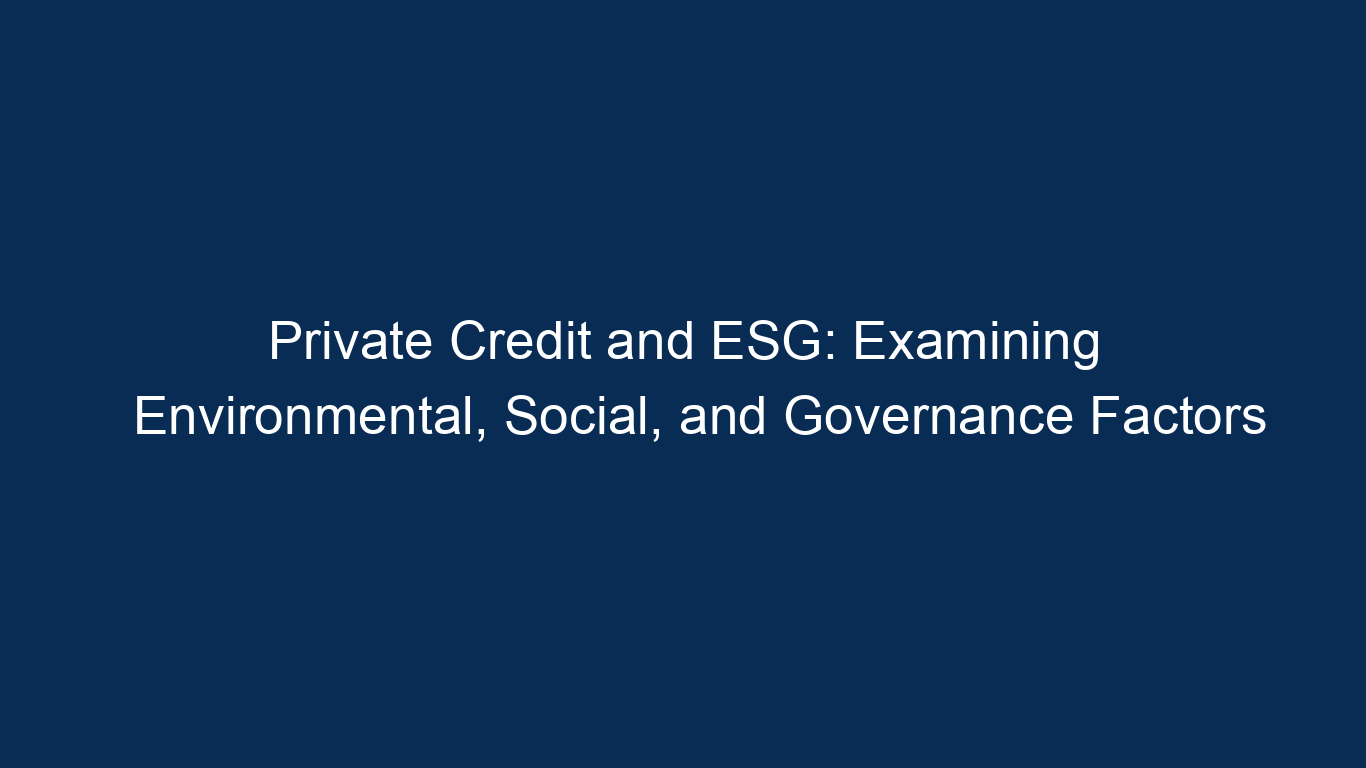The Intersection of Private Credit and ESG: Understanding the Importance of Environmental, Social, and Governance Factors
In the world of finance, the intersection of private credit and environmental, social, and governance (ESG) factors is gaining increasing attention. Private credit refers to the lending and investment activities that take place outside of traditional banking institutions, such as loans provided by private equity firms, hedge funds, or other non-bank financial institutions. ESG factors, on the other hand, are criteria used to evaluate the sustainability and societal impact of an investment or business.
The importance of considering ESG factors in private credit cannot be overstated. In recent years, there has been a growing recognition that companies with strong ESG performance are more likely to be financially successful and resilient in the long term. This is because companies that prioritize environmental sustainability, social responsibility, and good governance practices are better equipped to manage risks and seize opportunities in an increasingly complex and interconnected world.
From an environmental perspective, private credit investors are increasingly focusing on companies that are committed to reducing their carbon footprint, conserving natural resources, and mitigating the impact of climate change. This is not only driven by a desire to protect the environment, but also by the recognition that companies that fail to adapt to changing environmental regulations and consumer preferences may face financial and reputational risks in the future.
Similarly, social factors are becoming an important consideration in private credit. Investors are increasingly looking for companies that promote diversity and inclusion, prioritize employee well-being, and contribute positively to the communities in which they operate. This is not only a matter of ethical responsibility but also a recognition that companies that prioritize social factors are more likely to attract and retain top talent, build strong customer relationships, and maintain a positive brand image.
Finally, governance factors are critical in private credit. Investors are increasingly interested in companies that have transparent and accountable management structures, strong board oversight, and effective risk management practices. This is because companies with strong governance practices are better able to navigate complex regulatory environments, make sound strategic decisions, and maintain the trust and confidence of investors.
In conclusion, the intersection of private credit and ESG factors is becoming increasingly important in the world of finance. Private credit investors are recognizing that companies with strong ESG performance are more likely to be financially successful and resilient in the long term. By considering environmental, social, and governance factors in their investment decisions, private credit investors can not only contribute to a more sustainable and equitable society but also mitigate risks and enhance returns.
Incorporating ESG Principles in Private Credit Investing: A Win-Win Strategy for Investors and the Planet
Private credit investing refers to the practice of providing loans to companies or individuals that are not publicly traded. In recent years, there has been a growing interest in incorporating Environmental, Social, and Governance (ESG) principles into private credit investing. This approach aims to align investment decisions with sustainability goals and ethical considerations. By considering ESG factors when making investment decisions, investors can create a win-win situation for themselves and the planet.
ESG principles are a set of criteria used to evaluate the sustainability and societal impact of an investment. Environmental factors refer to issues such as climate change, resource depletion, and pollution. Social factors encompass topics like labor rights, diversity and inclusion, and community relations. Governance factors involve examining the management and decision-making processes of a company, including issues like board diversity, executive compensation, and shareholder rights.
Incorporating ESG principles into private credit investing can benefit investors in several ways. First, it can help mitigate risks associated with environmental and social issues. For example, by evaluating a company’s environmental practices, investors can identify potential risks related to climate change or regulatory compliance. This can help avoid investments in companies that may face financial losses due to environmental liabilities or reputational damage.
Second, considering ESG factors can provide investors with valuable insights into the long-term sustainability of a company. Companies that prioritize ESG practices are more likely to have a solid foundation for future growth and profitability. By investing in these companies, investors can position themselves for long-term success and potentially higher returns.
Furthermore, incorporating ESG principles can enhance the reputation of investors. In an increasingly socially conscious world, investors are expected to consider the broader impact of their investment decisions. By aligning their investments with ESG principles, investors can demonstrate their commitment to responsible investing and attract like-minded clients and partners.
From a broader perspective, incorporating ESG principles into private credit investing can contribute to a more sustainable and equitable society. By directing capital towards companies that prioritize environmental and social considerations, investors can support the transition to a low-carbon economy, promote social justice, and foster inclusive growth. This approach can help address pressing global challenges, such as climate change, inequality, and human rights abuses.
To effectively incorporate ESG principles into private credit investing, investors need access to reliable and standardized ESG data. This data can help evaluate the ESG performance of potential borrowers and identify opportunities for improvement. Collaboration among investors, borrowers, and ESG rating agencies is crucial to promote transparency and ensure the accuracy of ESG information.
In conclusion, incorporating ESG principles in private credit investing is a win-win strategy for investors and the planet. By considering environmental, social, and governance factors, investors can mitigate risks, enhance their reputation, and contribute to a more sustainable and equitable society. As the importance of sustainability and ethical considerations continues to grow, private credit investors have an opportunity to align their investments with their values and make a positive impact on the world.
Private Credit and ESG: How Environmental, Social, and Governance Factors Can Drive Sustainable Financial Returns
Private Credit and ESG: How Environmental, Social, and Governance Factors Can Drive Sustainable Financial Returns
In recent years, there has been a growing recognition of the importance of Environmental, Social, and Governance (ESG) factors in investment decision-making. ESG refers to a set of criteria that investors use to evaluate the sustainability and ethical impact of an investment in a company or project. While traditionally associated with public equities, ESG considerations are now increasingly being applied to the private credit market.
Private credit refers to non-bank loans made to companies that are not publicly traded. These loans are typically used to fund growth, acquisitions, or refinancing activities. Private credit offers several advantages over traditional bank loans, including greater flexibility in terms and lower regulatory constraints. As such, it has become an attractive option for both borrowers and investors.
ESG integration in private credit involves assessing the ESG risks and opportunities associated with a borrower or project, and incorporating them into the investment decision-making process. This can be done through various means, such as ESG due diligence, ongoing monitoring, and active engagement with borrowers.
Environmental factors consider the impact of a borrower or project on the natural environment. This can include assessing the carbon footprint, resource usage, and waste management practices of a company. For example, a private credit investor may evaluate a renewable energy project based on its potential to reduce greenhouse gas emissions and contribute to the transition to a low-carbon economy.
Social factors focus on the impact of a borrower or project on society. This can include evaluating labor practices, employee health and safety, and community relations. For instance, an investor may consider the social impact of a private credit loan to a healthcare company that provides affordable and accessible healthcare to underserved communities.
Governance factors refer to the quality of a borrower’s corporate governance structure and practices. This can involve assessing the independence and expertise of the board of directors, the effectiveness of internal controls, and the transparency of financial reporting. A private credit investor may prioritize companies with strong governance practices, as they are more likely to make sound business decisions and mitigate risk.
By incorporating ESG factors into the private credit investment process, investors can drive sustainable financial returns. Companies that effectively manage ESG risks are more likely to be resilient and outperform their peers in the long run. They are also less exposed to reputational and regulatory risks, which can negatively impact financial performance.
Furthermore, integrating ESG considerations into private credit can provide investors with valuable insights into the sustainability and ethical impact of their investments. This can enhance risk management and contribute to the achievement of broader environmental and social goals.
In conclusion, private credit investors are increasingly recognizing the importance of ESG factors in driving sustainable financial returns. By integrating ESG considerations into the investment process, investors can assess the environmental, social, and governance risks and opportunities associated with a borrower or project. This can lead to more informed investment decisions, improved risk management, and the promotion of sustainable development.
Unveiling the Potential of Private Credit in Promoting ESG Goals: A Closer Look at Environmental, Social, and Governance Factors
Private credit has emerged as a powerful tool in promoting Environmental, Social, and Governance (ESG) goals. With its ability to allocate capital to projects that prioritize sustainability, social responsibility, and ethical practices, private credit has the potential to drive positive change in various industries. In this article, we will take a closer look at the role of private credit in promoting ESG goals and its implications for investors and the broader society.
Private credit refers to the provision of loans and other debt instruments by non-bank financial institutions to companies that do not have access to traditional lending sources. These non-bank lenders, such as private equity firms, hedge funds, and specialized credit funds, have the flexibility to invest in industries and projects that align with ESG principles. By selecting borrowers with strong ESG practices, private credit providers can channel capital towards sustainable and socially responsible initiatives.
One of the key advantages of private credit in promoting ESG goals is its ability to engage directly with borrowers. Unlike public market debt instruments, private credit allows lenders to have a closer relationship with the companies they finance. This proximity enables private credit providers to conduct thorough due diligence on the ESG practices of potential borrowers and to actively monitor their progress in implementing sustainable initiatives. By doing so, private credit providers can incentivize and support companies in adopting and improving their ESG performance.
Furthermore, private credit providers can utilize various financial instruments to align their investments with ESG goals. For instance, they can structure loans with specific covenants that require borrowers to meet predefined sustainability targets. These targets may include reducing carbon emissions, increasing energy efficiency, improving labor standards, or enhancing board diversity. By linking financial incentives to ESG performance, private credit providers can encourage companies to prioritize these goals and drive meaningful change.
The impact of private credit in promoting ESG goals extends beyond the borrowers themselves. As private credit providers increasingly integrate ESG factors into their investment strategies, they signal to the broader market the importance of sustainability and responsible practices. This creates a ripple effect, encouraging other market participants, including traditional lenders and investors, to consider ESG factors in their decision-making process. The growing recognition of ESG as a crucial aspect of investment evaluation can incentivize companies to improve their ESG performance to attract capital and enhance their long-term viability.
However, it is essential to acknowledge that private credit’s potential in promoting ESG goals is not without challenges. The measurement and reporting of ESG performance can be complex and subjective, making it difficult for private credit providers to assess the true impact of their investments accurately. Additionally, there is a need for standardized ESG metrics and reporting frameworks to enable consistent evaluation and comparison of companies’ ESG practices. The development of such frameworks would enhance transparency and facilitate better decision-making for private credit providers and investors alike.
In conclusion, private credit has the potential to be a significant driver of positive change in advancing ESG goals. Its ability to allocate capital to sustainable and socially responsible initiatives, engage directly with borrowers, and incentivize ESG performance makes it a powerful tool in promoting responsible investing. As private credit providers continue to integrate ESG factors into their investment strategies, they can contribute to the broader adoption of sustainable practices across industries and drive long-term value for investors and society as a whole.
Private Credit and ESG: Exploring the Growing Trend of Sustainable Investing in the Private Credit Market
Private Credit and ESG: Exploring the Growing Trend of Sustainable Investing in the Private Credit Market
Sustainable investing has gained significant momentum in recent years, with investors increasingly looking to align their financial goals with their environmental, social, and governance (ESG) values. While sustainable investing has traditionally been associated with public equities, there is a growing trend of incorporating ESG considerations into the private credit market.
Private credit refers to debt financing provided by non-bank lenders to privately held companies. This form of financing has become increasingly popular in recent years, as it offers an alternative to traditional bank loans and allows borrowers to access capital quickly and efficiently. As sustainable investing gains traction, investors are now seeking to incorporate ESG factors into their private credit investments.
ESG considerations in private credit involve evaluating the environmental, social, and governance practices of potential borrowers. This includes assessing a company’s impact on the environment, its treatment of employees, and the quality of its corporate governance. By incorporating ESG criteria into the investment process, investors can identify companies that are committed to sustainable practices and are more likely to generate long-term value.
There are several reasons why investors are increasingly interested in sustainable investing in the private credit market. First, sustainable investing allows investors to align their financial interests with their values. By supporting companies that prioritize ESG factors, investors can contribute to positive social and environmental change while also seeking financial returns.
Second, incorporating ESG factors into the investment process can help investors identify risks and opportunities that may not be apparent through traditional financial analysis. For example, companies with poor environmental practices may face regulatory challenges or reputational damage, which can impact their ability to repay debt. On the other hand, companies that prioritize sustainability may benefit from lower operating costs and improved customer loyalty.
Third, there is growing evidence that companies with strong ESG practices tend to outperform their peers over the long term. Numerous studies have shown that companies that prioritize sustainability are more resilient, have better financial performance, and are less likely to face legal or reputational issues. By investing in companies with strong ESG practices, investors can potentially enhance their risk-adjusted returns.
However, incorporating ESG considerations into the private credit market is not without challenges. Unlike public equities, where there is a wealth of publicly available data on ESG practices, private credit investors often face limited information on potential borrowers. This makes it challenging to assess a company’s ESG performance and can increase due diligence costs.
To address these challenges, investors are increasingly relying on third-party ESG ratings and certifications. These ratings provide standardized assessments of a company’s ESG performance, allowing investors to compare potential borrowers and make more informed investment decisions. Additionally, industry initiatives, such as the UN-supported Principles for Responsible Investment (PRI), are working to develop standards and guidelines for ESG integration in the private credit market.
In conclusion, the growing trend of incorporating ESG considerations into the private credit market reflects the increasing importance of sustainable investing. By evaluating the environmental, social, and governance practices of potential borrowers, investors can align their financial goals with their values and potentially enhance their risk-adjusted returns. While challenges exist, the development of standardized ESG ratings and industry initiatives are driving progress in this area. As the private credit market continues to evolve, incorporating ESG factors is likely to become an increasingly important aspect of investment decision-making.






